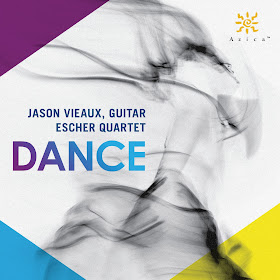Wednesday, July 10, 2019
A fluid fusion of melody and dance
Dance: Music for guitar and string quartet by Castelnuovo-Tedesco, Aaron Jay Kernis and Luigi Boccherini
When I listened to this new CD from guitarist Jason Vieaux and the Escher Quartet, I was reminded of a phrase of John Eliot Gardiner, who said of the Baroque music of Bach and Rameau that it had "the fluidity of gesture and step and the fusion of melody and dance". Though the music of Castelnuovo-Tedesco, Luigi Boccherini and Aaron Jay Kernis is a bit later (disco was after the Baroque, right?), this is definitely what's happening on this album, from the first habanera to the last fandango.
Castelnuovo-Tedesco's Quintet for Guitar & Strings earns its place on this dance-card with the tarantella & habanera in the finale, but the entire work is delightful. It has that perfect balance of folkloric and erudite music of the best chamber works of Villa-Lobos, for example, or Bartok. Vieaux and the Eschers judge everything just right.
The title of Aaron Jay Kernis's 100 Greatest Dance Hits is a very funny reference to the K-Tel TV ads of the 1970s, but the music itself begins in a mainly serious mode. The elaborate percussive effects of the Introduction set the stage for a most interesting and unexpected 20 minutes of music. It might not remain serious, but it's always clever. The 3rd movement, "Middle Of The Road Easy Listening Slow Dance Ballad" contains absolutely gorgeous melodies, but Kernis keeps turning the screw, and the piece veers hilariously, and then perhaps seriously, off the rails. The laughs come fast and furious in the final movement, "Dance Party on the Disco Motorboat," with its slapstick coda. I was reminded throughout this music of the Brazilian composer Gilberto Mendes, whose Ulysses in Copacabana Surfing with James Joyce and Dorothy Lamour for orchestra is somewhat in the same vein. Successful classical music humour is rare indeed, so it's nice to have Mendes and Kernis to give us some comic relief every now and then. Vieaux and the Escher Quartet must have had a ball performing this - I expect if the musicians don't, everyone will notice.
Take a moment before moving on to the Boccherini Guitar Quintet, so that it doesn't sound fussy and old-fashioned after the Kernis. Because it isn't fussy, and the musicians play it with perfect sensitivity to its Enlightenment ethos, making it sound fresh and alive, but always civilized. Still, Boccherini really lets his inner Tony Manero out in the Fandango Finale, which has been a crowd pleaser, I'm sure, since the 18th century. It's introduced by a lovely little mock-serious movement that for a moment crosses over into Mozartian pathos. This Boccherini Quintet is a triumph for Jason Vieaux and the Escher Quartet; it brought me as much pleasure as many a more substantial chamber work by Haydn or Mozart or Beethoven.

No comments:
Post a Comment